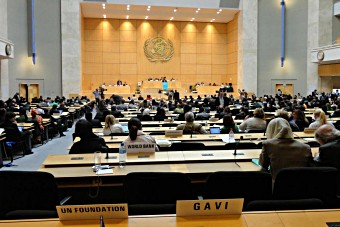
The 66th World Health Assembly will take place in Geneva from 20-28 May 2013.
1. Recognition of vaccines role in fight against non-communicable diseases
WHA Member States are set to adopt the Global Monitoring Framework (GMF) for non-communicable diseases (NCDs) and endorse the draft Global NCD Action Plan 2013-2020. Both strategies are important for GAVI as they recognise that vaccination against infection-related cancers plays a critical role in the fight against NCDs.
NCDs, which are mainly cardiovascular diseases, cancer, diabetes and chronic lung diseases, are the leading cause of deaths around the world and are on the rise, especially in developing countries where access to services can be limited.
Immunisation is now viewed as one of the key elements in the effort to reach the global target of a 25% reduction of NCDs by 2025. In particular, two indicators in the global monitoring framework focus on two safe & effective vaccines that can prevent infection-related cancers:
- liver cancer with the hepatitis B (hepB) vaccine;
- cervical cancer with the human papillomavirus (HPV) vaccine.
GAVI CEO, Seth Berkley, commenting on WHO cost effective recommendations on combating NCDs
Both vaccines are supported by GAVI. In the past 10 years, the Alliance has supported the immunisation of 267 million infants against hepB in developing countries and prevented an estimated 3.8 million future deaths from liver cancer in the poorest countries of the world.
Last week, Kenya became the first country to protect girls against cervical cancer with GAVI-supported HPV vaccines. The delivery of the vaccines followed confirmation that GAVI had secured a record low price for the vaccines. By 2020, GAVI expects more than 30 million girls in over 40 of the world’s poorest countries to have been immunised with the HPV vaccine.
2. Post MDGs consultation and Global Health and Diplomacy after 2015
The GAVI Alliance will participate in a side-event on the Post-2015 Millennium Development Goals (MDGs) consultation, co-hosted by the WHO; the Government of Sweden; UNICEF, The Center for Global Health & Diplomacy and the Government of Botswana.
Given that health is a core driver of development as well as a key indicator of what development seeks to achieve, GAVI has joined the call for the inclusion of a strong specific health goal in the post-2015 development agenda, accompanied by robust indicators to measure progress.
GAVI and our partners are proposing the “fully immunised child” as an ambitious but practical indicator under a health goal.
Routine immunisation, measured through diphtheria-tetanus-pertussis (DTP3) coverage rates, has long been recognised as a sound proxy measure for the strength of a health system. However, a fully immunised child indicator, measuring the universal provision of all 11 antigens recommended for infants everywhere in the world, would modernise this yardstick and refocus on people rather than diseases.
3. GAVI-Senegal side event
At this interactive briefing, Ministers, national delegations, partners and stakeholders will share their views, successes and challenges on immunisation with GAVI CEO Dr Seth Berkley. Dr Berkley will discuss GAVI’s vision on immunisation, including programme and policy updates. Senegal will present the country’s experience of GAVI support.
Country perspectives on the successes and challenges of rolling out new vaccines will be presented, followed by a lively exchange around lessons learned.
4. Global Vaccine Action Plan report
One year on from the WHA’s adoption of the Global Vaccine Action Plan (GVAP), a report will be shared with Member States reviewing country progress toward the plan’s vision of a world in which everyone enjoys a life free from vaccine-preventable diseases.
The GVAP outlined the actions necessary to achieve the Decade of Vaccines’ vision and goals, identifying policy, resource, and other gaps that must be addressed to realise the full potential of vaccines by 2020 and beyond.
GAVI, which fully supports the GVAP’s vision, continues to accelerate the number of vaccine introductions, secure price reductions, and actively shape the vaccines' market while further strengthening partnerships with countries.
- GAVI’s ambitious plan to roll out the HPV vaccine in more than 40 countries by 2020 and vaccinate more than 30 million girls against HPV by 2020 has started with Kenya last week. Seven more countries will receive GAVI support to introduce HPV demonstration programmes.
- Pentavalent is now part of the routine schedule in 71 of the 73 GAVI eligible countries, while the Alliance is on track in its plans to introduce rotavirus vaccine and pneumococcal vaccines with a total of over 20 and 35 introductions respectively, by the end of 2013.
- GAVI is moving to a more proactive effort through its new vaccine strategy for supply and procurement, which entails a tailored approach for each vaccine to stimulate innovation, competition and new quality manufacturers.
- The pentavalent vaccine price was reduced by 30% this year and a new record low price for HPV vaccines will help ensure millions of girls in developing countries can be protected against cervical cancer.
